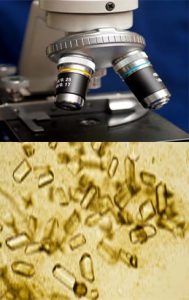Ron Hines DVM PhD
 See What Normal Blood & Urine Values Are
See What Normal Blood & Urine Values Are
 Causes Of Most Abnormal Blood & Urine Tests
Causes Of Most Abnormal Blood & Urine Tests
Your Dog Or Your Cat’s Uric Acid Level – In Its Blood Or In Its Urine
There is normally a small amount of uric acid in the blood and urine of all mammals – including healthy dogs and cats. But there is not nearly as much as in the blood and urine of birds and reptiles. (read here)
Uric acid is a breakdown product of purines, compounds that are found in all cells of the body. Organ meats your dog or cat consumes, like liver and kidney, are very rich in purines. Plant ingredients in your pet’s diet contain considerably smaller amounts.
A potential problem is that uric acid is not very soluble in the water contained in blood or urine. When uric acid levels get too high, the compound can fall out of solution and forms crystals. When that occurs in dogs, humans or birds, they can develop health issues. In humans and birds, the result is the formation of uric acid gout crystals in and surrounding joints.
Dogs and cats do not develop gout the way people birds and reptiles do. Instead of joint arthritis, several breeds of dogs (dalmatians, English bulldogs, black Russian terriers) occasionally have inherited defective uric acid metabolism (their livers can’t convert uric acid to more soluble allantoin). In those animals that results in an excessive blood and urine uric acid (hyperuricosuria) level which can lead to uric acid stone (calculi) forming in their kidneys and bladder (urolithiasis). These stones occasionally occur in other breeds that are suffering from liver shunt problems. When these stones/calculi block the free flow of urine, they lead to medical emergencies. When they are present but still allow urination, over time they can still produce abnormal pressure due to flow resistance. That can slowly destroy the kidneys. Both situations are quite painful. Blood in the urine is a common pet owner observation.
What Might Prompt My Veterinarian To Check My Dog Or My Cat’s Blood And Urine Uric Acid Level?
Your veterinarian might have submitted a kidney or bladder stone to a laboratory and found that it was composed of urates (uric acid).
The vet may be screening a potential breeder dog of the susceptible breeds for a genetic tendency to urate kidney stones or as a precautionary measure in a susceptible breed.
The vet might be trying to judge the effectiveness of the treatment he/she provided to prevent a reoccurrence of urate stones (allopurinol medication and special low-purine diets).
About 6% of the urinary tract stones that occur in cats are said to contain uric acid (as urate crystals). We do not really know why that occurred; but in a few of those cats, liver circulatory problems (portosystemic shunts) or genetically caused kidney defects appear to be the root cause. Some theorize that a diet high in purines (such as anchovies, sardines, liver, kidney and other organ meats) might be involved. Whatever the cause, cats that do not drink adequately and who exist primarily on dry diets are probably at a higher risk because their urine is more concentrated and stones and crystals are more likely to form in a concentrated solution than a dilute one.
The concentration of urine (so consequently the amount of uric acid in it) varies throughout the day. Determining the ratio of uric acid to urine creatinine helps correct for that, since the urine’s concentration of creatinine is more stable throughout the day. A better alternative is probably analyzing a pooled 24-hour urine collection from your pet for uric acid content.
Because uric acid readily leaves solution and falls to the bottom of a urine specimen as crystals, care must be taken that the urine sample be fresh, well mixed prior to testing and not overly chilled during its storage.
Human physicians have noticed that high levels of uric acid in blood and urine do not predict the likelihood of gout developing as well as they had hoped they would. Some people with very high uric acid levels never develop gout and some people with somewhat lower levels do. So, in humans at least, other factors must be involved. If that also pertains to dogs and cats developing urate urinary tract stones is something that veterinarians do not know.
Complementary Tests:
A genetic test, the DNA test for the SLC2A9 mutation as run by the Veterinary School, UC Davis CA, for a gene mutation in uric acid metabolism (hyperuricosuria). (read here)
DxMe



